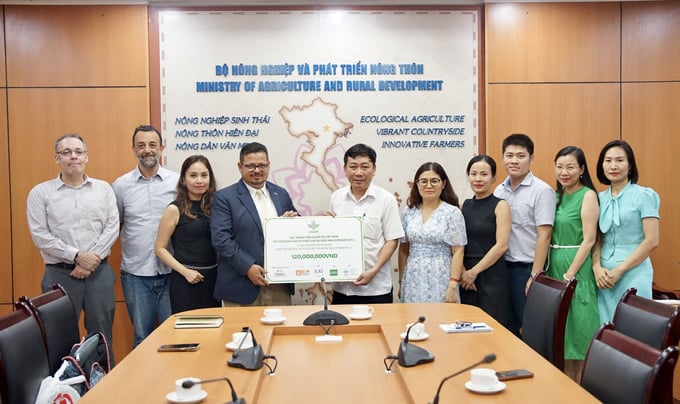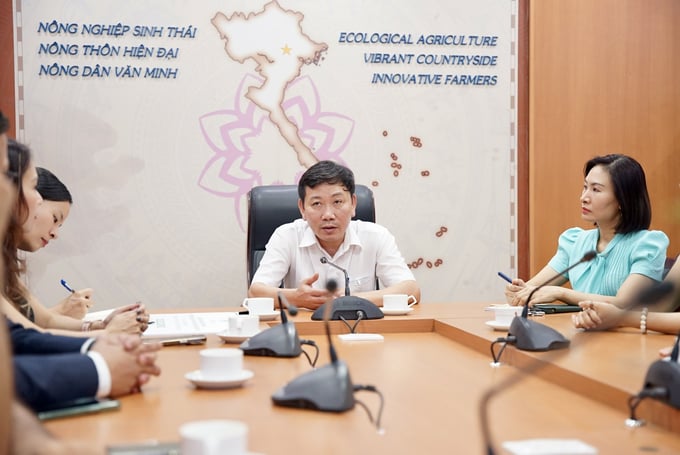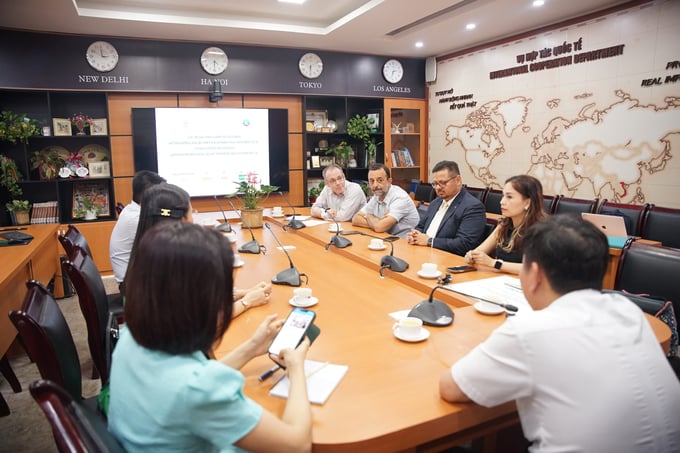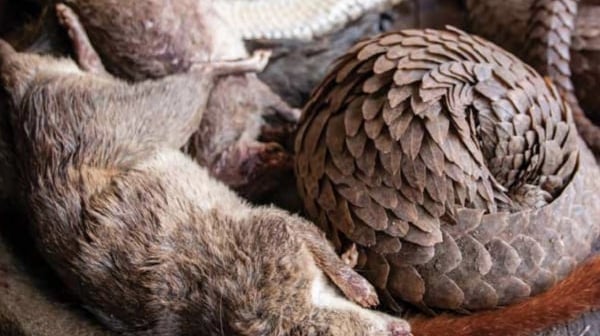May 29, 2025 | 08:58 GMT +7
May 29, 2025 | 08:58 GMT +7
Hotline: 0913.378.918
May 29, 2025 | 08:58 GMT +7
Hotline: 0913.378.918

Representatives from the International Cooperation Department and the Vietnam Disaster and Dyke Management Authority received support from One CGIAR Vietnam. Photo: Linh Linh.
The 120 million VND was contributed from one working day of the staff and researchers of One CGIAR Vietnam (Consultative Group for International Agricultural Research) for those affected by Typhoon Yagi.
Mr. Nguyen Do Anh Tuan, Director of the International Cooperation Department (MARD), expressed gratitude and appreciation for the noble deed of the partners, which has shared in the difficulties faced by Vietnam in general and the agricultural sector in particular following the disaster.
Sharing information about the damages caused by the typhoon, Mr. Tuan noted that over 200,000 hectares of rice were flooded and severely devastated, almost completely lost. The crop sector has shifted focus to early winter crops such as vegetables, sweet potatoes, carrots, and cabbages. Therefore, the support from partners for seeds and fertilizers for farmers is extremely important.

ICD Director Nguyen Do Anh Tuan believes that the support from partner groups may demonstrate to the world that One CGIAR has worked closely with MARD to build a more resilient Vietnam in the face of natural disasters. Photo: Linh Linh.
In the livestock sector, approximately 3 million chickens and about 25,000 livestock were killed by the storm. The aquaculture sector, particularly fish farming, also suffered severe losses. The Director of ICD added that both sectors are in need of support in terms of livestock breeds and fish and shrimp seeds to recover production, as domestic suppliers are facing challenges.
The leadership of the International Cooperation Department hopes for further collaboration to help Vietnam recover quickly after the storm. In addition, the support from partner groups may demonstrate to the world that One CGIAR has worked closely with MARD to build a more resilient Vietnam in the face of natural disasters.
A representative of One CGIAR shared sympathy for the difficulties faced by Vietnam due to the aftermath of Typhoon Yagi, emphasizing that the partner group is ready to act to support Vietnam post-storm.
Dr. Diego Naziri from International Potato Center (CIP) expressed hope that One CGIAR's contribution could help people in disaster-affected areas overcome some of their challenges and recover. Perhaps it is also an opportunity as MARD to reflect a bit how we can make agricultural system more resilient to this kind of shocks related to extreme weather events, he stated.
"When Typhoon Doksuri hit Quang Binh in 2017, many crops like acacia and bananas were severely damaged. However, crops like potatoes fared relatively well. This has prompted us to conduct further research to understand how certain crops can enhance farmers' resilience and help them recover faster, particularly through short-cycle crops," Dr. Naziri shared.

A representative from One CGIAR emphasized the need to transition from passive response to a state of preparedness and resilience. Achieving this requires strong support from the global scientific community. Photo: Linh Linh.
“This approach is also being applied by organizations such as the World Food Programme. One CGIAR, as an international research organization, is committed to supporting MARD with scientific contributions to help mitigate the impact of future disasters. In this situation, we are not only focused on reducing immediate damage and supporting those affected but also thinking about long-term solutions to help Vietnam and the world become more resilient to natural disasters,” Mr. Naziri shared.
He also emphasized the need to transition from a passive response to a state of preparedness and recovery. Achieving this requires strong support from the global scientific community.
Additionally, to meet the urgent needs of people heavily affected by Typhoon Yagi, the CGIAR One Health Initiative, through the Livestock and Animal Health Sub-Departments of Lao Cai and Thai Nguyen provinces, provided 50 million VND to each province to purchase supplies and disinfectants to help people clean their homes and livestock areas after the storm.
The One Health Initiative, through the One Health Field Site at Thai Nguyen University of Agriculture and Forestry, also provided 200 million VND to purchase supplies and disinfectants, and mobilized students from the university’s clubs at the field site to help residents clean and disinfect their homes and livestock areas, so they could return to stable living conditions as soon as possible.
ICRAF (World Agroforestry) provided emergency support of 91 million VND to 40 households in the provinces within ICRAF’s project areas affected by the floods.
The One CGIAR transition is a dynamic reformulation of CGIAR’s partnerships, knowledge, assets and global presence, aiming for greater integration and impact in the face of the interdependent challenges facing today’s world. Members of the One CGIAR include AfricaRice, Bioversity International – Research on agricultural biodiversity, CIAT (International Center for Tropical Agriculture), CIP (International Potato Center), ILRI (International Livestock Research Institute), IRRI (International Rice Research Institute), etc.
Translated by Dieu Linh

(VAN) Bamboo products from Thang Tho Bamboo Cooperative have reached many countries around the world, while also creating jobs for local workers.

(VAN) The Management Board of Con Dao National Park reported that a green sea turtle, tagged in the Philippines, has traveled thousands of kilometers to lay 84 eggs on Bay Canh Islet.

(VAN) Green technology is paving a new path for sustainable aquaculture in the Mekong Delta in particular and across the country in general, helping reduce emissions and adapt to climate change.

(VAN) On May 27, La French Tech Vietnam (the French startup and innovation community in Vietnam) held the French Tech Summit Vietnam 2025.
/2025/05/27/4731-2-223159_980.jpg)
(VAN) No votive paper, no styrofoam, no plastic bags, no plastic bottles, and no single-use plastic trays are the key rules tourists should keep in mind when visiting Con Dao.

(VAN) In the fight against plastic pollution, Vietnam has been demonstrating a proactive, pioneering, and active role in addressing the greatest environmental challenge today.

(VAN) The WOAH guidelines provide a vital tool for risk chain analysis, covering the extraction, transportation, consumption, and handling of confiscated wildlife.